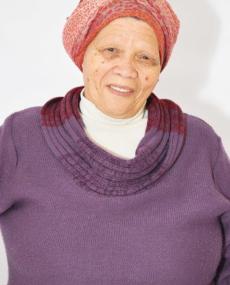
Maggie Oewies-Shongwe was born in 1940 in Namaqualand, Cape Province (now Northern Cape Province). As the youngest in the house, she often stayed at home with her grandparents (who raised her) while her older relatives went to work. She would help her grandmother, who was the local midwife, take care of new-born babies.
Growing up, she quickly developed an inquisitive mind and was always asking questions – much to the delight of her grandfather who welcomed her curiosity. However, another thing she leant from a young age was tragedy, which came when she witnessed the murder of her father when she was just seven years old. Although he was not always around, they were still very close and she would later describe that moment as the most tragic of her life.
She was forced to grow up fast, moving to Cape Town, Cape Province (now Western Cape) at the age of nine where she started working as a childminder and domestic worker. It was at this time that she became highly aware of the inequality experienced by Black labourers at the time, especially those who worked in low-income jobs like housekeepers, gardeners, caregivers, caretakers, butlers, and casual workers. She soon realised that domestic workers needed support and set out to make that change.
In 1974, during the height of apartheid, she founded one of the first domestic worker labour organisations in South Africa, the Domestic Workers’ Association (DWA). With the encouragement and support of the greater community and the likes of Helen Suzman – who was the first to sign up her gardener – the organisation boldly set out to fight for the rights of these workers. However, as more and more politically- affiliated labour organisations sprung up, she started to redirect her focus towards childcare services as she did not believe that politics and labour matters should mix. As a result, in 1984, with the support of her late husband Lewis Shongwe, she started the Pinocchio Crèche in Green Point, Cape Town, a project branch of the DWA which sought to provide a safe and close place where the organisation’s members could leave their children whenever they went to work.
Her passion for creating a better future for children culminated in an important victory that came in 1991. After three years of campaigning, she finally managed to persuade the Department of Education to open Model C schools to all races. This historical event received widespread media attention as both local and international media covered the achievement.
In 2001, the DWA was relaunched under the Domestic Workers’ Association Educational Trust. Although Maggie Oewies-Shongwe is now retired, she continues to speak out against issues of poverty and injustice faced by domestic workers.